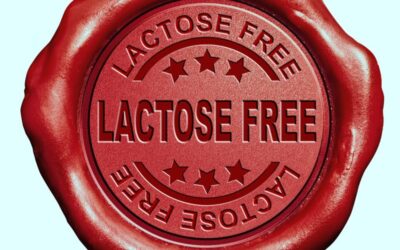Polycystic ovary syndrome (PCOS) and irritable bowel syndrome (IBS) are two conditions that can significantly impact a woman’s health. While seemingly unrelated, research suggests a potential link, with a higher prevalence of IBS in women with PCOS. It can be a difficult juggling act if you’re managing both, the low FODMAP diet can offer some relief. So, in this blog I explore PCOS and diet and possible links and solutions to IBS and FODMAPs.
What is PCOS and what are the symptoms?
Symptoms of PCOS can take many forms from absent or missed periods to excessive hair growth. However, for many it’s the food cravings, particularly for carbohydrate or sugary foods that’s frustrating. Many of these symptoms relate to high hormone levels such as androgens and insulin. Up to 80% of people with PCOS are resistant to the effects of insulin and thus have more insulin in their blood to compensate. Insulin also increases testosterone levels. Although testosterone is often thought of as a male hormone, all women need a small amount too. Having even slightly higher levels of testosterone can upset the balance of hormones in the body and lead to acne, excess hair and irregular periods. For more information on PCOS see the NHS website.
The gut-PCOS connection
The gut microbiome, is the name given to the community of bacteria in your gut. The microbiome plays a crucial role in overall health and immunity. Studies suggest an imbalance in gut bacteria may contribute to PCOS symptoms like insulin resistance and inflammation. Latest research in this field, show far-reaching implications of a dysfunctional microbiome. These include: poor immunity, IBS symptoms, development of disease and even effects on mood and mental health. See my other blog for more information on the microbiome.
How can dietary changes help PCOS?
Here are some general nutrition principles which can help improve PCOS symptoms:
- Try to eat a regular balanced diet: This will help keep blood sugar levels stable and reduce insulin resistance. Having regular, varied and balanced meals or snacks is a great place to start in achieving a healthy diet
- Try to choose low GI (Glycaemic Index) carbohydrates and wholegrain foods: Eating low GI foods can improve insulin levels and resistance and therefore reduce the symptoms of PCOS. Eating low GI foods is also linked with having more regular periods. Many wholegrains have a low GI, so are a good choice
- Include more omega-3 fats: Oily fish is a rich source of omega-3 which can help lower inflammation commonly seen in those with PCOS. Aim for one to two portions a week of oily fish. Try to include some plant-based sources of omega-3 such as seaweed, algae, chia seeds, flax seeds and walnuts
Body weight and PCOS
PCOS can affect people of all sizes, but if you’re carrying extra weight, some weight loss may improve PCOS symptoms. However, insulin resistance, food cravings and over-eating can make weight loss with PCOS harder. Try to focus on what to include in your diet, rather than following a faddy diet and the ideas above is a good place to start. The most important thing is finding something which fits into your lifestyle without missing out on important foods or nutrients.
Exercise and PCOS
Being physically active has many known benefits, but the most relevant to PCOS is that it improves your body’s response to insulin. Types of exercise could include resistance or cardiovascular training, but even more gentle forms of movement like yoga or walking are beneficial. It’s important to find something that you enjoy and can fit into your lifestyle.
IBS and FODMAPs
IBS symptoms are problematic for 15-20% of the UK population. Symptoms range from mild in some individuals to severe and life-affecting for others. In recent years, the low FODMAP diet has provided a life-line to many IBS sufferers. Using a process of elimination and reintroduction of known high FODMAP foods, sufferers can identify their unique triggers. FODMAPs are short-chain carbohydrates poorly absorbed by the small intestine. These fermentable sugars can be responsible for triggering digestive discomfort in those with IBS symptoms. For more information and FAQs about the low FODMAP diet, see my blog. The low FODMAP diet can be tricky to do alone and the best results are always seen when supervised by a FODMAP-trained Dietitian.
Can a low FODMAP diet help with PCOS?
While not a cure for PCOS, the low FODMAP diet might offer some benefits:
- Reduced bloating: Both PCOS and IBS can cause bloating. By identifying your FODMAP triggers, you can experience some relief from bloating and discomfort
- Improved gut health: By implementing the low FODMAP diet and identifying your triggers, this will be beneficial for overall health, immunity and a sense of wellbeing. Potentially improving PCOS symptoms with less pressure in the lower abdomen
- Blood sugar management: PCOS can lead to insulin resistance. With expert advice and support, the low FODMAP diet can promote blood sugar control, which can be helpful for PCOS management
Important considerations
- Individualized approach: The low FODMAP diet may not be the answer for everyone. It’s important to check with your GP before making major dietary changes. Find an IBS Dietitian trained in FODMAPs to determine if this approach is right for you
- FODMAP elimination is temporary: The initial elimination phase of the low FODMAP diet is meant to be short-term only. An IBS Dietitian can guide you through this and the reintroduction process to find your personal tolerance levels. They can also use their expertise to make this less arduous for you and make it practical to fit in with your daily life
- Nutrient adequacy: The low FODMAP diet can mean restricting certain food groups. Your Dietitian can ensure you’re getting the essential nutrients your body needs
Getting started with PCOS and FODMAPs
If you’re interested in exploring the low FODMAP diet for PCOS symptom management, here are some steps:
- Educate yourself: Learn about the low FODMAP diet, but don’t be too anxious about this complex diet. It can seem daunting at first, but it improves symptoms of IBS in over 75% so it’s worth a try, but get expert help for the best results.
- Plan and prepare: Planning meals and prepping low FODMAP options can make following the diet easier. Your dietitian will give you lots of useful tips, including substitutions and bulk prep
- Consult a IBS Dietitian: Discuss your interest in the low FODMAP diet with a dietitian trained in FODMAPs. It’s a tricky diet to do alone and many give up along the way
You’re not alone – a FODMAP Dietitian can help
If you need expert advice and support, an IBS Dietitian trained in FODMAPs can use knowledge and experience to help you with the low FODMAP diet. It can be difficult to do alone, but with support, sufferers can identify their triggers and improve management of IBS symptoms. A FODMAP dietitian will provide practical ways to help you fit the low FODMAP diet into your lifestyle. Ensuring that you still get all the nutrients you need from your food. I offer a free initial telephone consultation, so why not arrange a call today.
Conclusion
Remember, making some simple dietary changes can help your PCOS symptoms, but if you also have IBS, then the low FODMAP diet may be a solution. For some women with PCOS and IBS, FODMAPs might offer a path toward improving gut health and managing symptoms. Working with a FODMAP-trained dietitian, you can determine if this approach is right for you.
Disclaimer: This blog is for informational purposes only and should not be taken as medical advice. Always consult with your GP before making any major changes to your diet or treatment plan.




